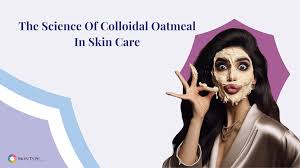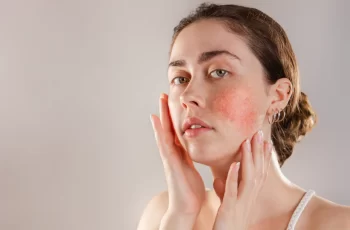
The Science of Colloidal Oatmeal in Skin Care
Colloidal oatmeal is a natural skin care ingredient with millennia of history supporting its use. This ingredient is loaded with beneficial compounds and is gentle on all skin types, but how does it work?
This blog will explore what colloidal oatmeal is, its unique composition, the distinct benefits it offers for skin health, and how it differs from regular oatmeal. We will also look into specific applications, such as colloidal oatmeal baths and creams.
To find the perfect products for your skin type, take the Baumann Skin Type Quiz, which also gets you a bonus $5 credit on your first order!
What is Colloidal Oatmeal?
Colloidal oatmeal is essentially oats that have been finely ground and then processed to retain all their skin-beneficial elements.
This fine grinding ensures that when added to water or skincare products, the oatmeal spreads evenly and does not settle quickly. Colloidal oatmeal is used either on its own as a bath additive, or alongside other ingredients in products like sunscreens, moisturizers, and even acne products.
Here are some of the best colloidal oatmeal products:
What is Oatmeal Made of?
Colloidal oatmeal is rich in several beneficial components, each contributing uniquely to its versatility in skincare:
Polysaccharides (60-64%) : These complex carbohydrates form a hydrating gel on the skin, enhancing moisture retention and creating a protective barrier against environmental irritants.
Proteins (10-18%) : Essential for repairing and maintaining the skin barrier, these proteins also help soothe inflamed skin.
Lipids (3-9%) : Including linoleic acid, oleic acid, and ceramides, these fats are crucial for reinforcing the skin’s natural barrier, improving hydration, and preventing moisture loss.
Avenanthramides : Exclusive to oats, these compounds are notable for their anti-inflammatory and anti-itch properties, significantly soothing irritated skin.
Benefits of oatmeal in skin care
Colloidal oatmeal offers a plethora of benefits for the skin, thanks to its rich composition:
Moisturizing : It helps lock in moisture and reduce transepidermal water loss.
Soothing : Especially beneficial for dry, itchy, or inflamed skin, colloidal oatmeal can calm symptoms of eczema and psoriasis.
Protecting : Forms a protective barrier against harsh environmental conditions.
Anti-Inflammatory : The presence of avenanthramides helps reduce inflammation and redness associated with sensitive skin conditions.
Because of its versatility, oatmeal is very common in skin care products. Here are some more of the best colloidal oatmeal products:
Is Oatmeal Safe for Skin?
Colloidal oatmeal is recognized by the FDA as safe and effective for use as a skin protectant. It is gentle enough for all skin types, including sensitive skin, making it a versatile ingredient in various dermatological formulations.
Other organizations including the Environmental Working Group (EWG) designate this ingredient as totally safe for use and sustainable for skin care.
It is important to note that though this ingredient has many uses and no major side-effects, it is still not a cure-all for skin care. It is not a potent enough ingredient to be a full regimen on its own, and is best used in formulations designed with multiple ingredients working together. Simply applying colloidal oatmeal to the skin and doing nothing else will not make a significant difference in your skin health.
Oatmeal vs Colloidal Oatmeal
While both derived from the same plant, their uses and processing differ significantly:
Regular Oatmeal : Typically consumed as food, consisting of whole or rolled oats.
Colloidal Oatmeal : Finely ground and processed specifically for topical application, making it easier for the skin to absorb.
Colloidal Oatmeal Baths for Hives and Rashes
Colloidal oatmeal baths are popular for their skin benefits, particularly in soothing itchy and inflamed skin. Usually, these baths come as simple colloidal oatmeal powder that is meant to be added to bathwater. The resulting bathwater is still mostly water – you aren’t really taking a bath in thick, goopy oatmeal.
Really, an oatmeal bath is more like “oatmeal tea,” where many of the compounds in the oats are seeping into the water (and then your skin).
Colloidal oatmeal baths work by creating a milky, protective layer on the skin, which helps to calm conditions like hives, rashes, and eczema. The baths are also effective in maintaining skin hydration and reducing the symptoms of dry skin conditions. After your oatmeal bath, it is advised to shower to remove lingering oats from your skin.
Colloidal Oatmeal Creams
Colloidal oatmeal creams are a great way to hydrate, soothe, and protect the skin. These creams are effective for treating dryness, reducing irritation, and soothing conditions like eczema and flaking or itchiness. Some oatmeal creams even have SPF, making them a great choice for daily sunscreens.
Here are some of the best colloidal oatmeal creams:
Which Skin Types Can Use Colloidal Oatmeal?
Colloidal oatmeal is gentle, non-comedogenic, non-greasy, pollution stopping natural ingredient that is very popular in skin care. Because of all those factors, this ingredient is safe for all Baumann Skin Types.
This doesn’t mean that all products with colloidal oatmeal are right for you, but that the ingredient itself is generally safe for all skin types.
If you are looking for the perfect colloidal oatmeal product for your skin care regimen, knowing your Baumann Skin Type is still important. All products are made with multiple ingredients, and not all of them are right for everybody. That’s where we come in – when you take our quiz, every product on the website that is right for your skin type will be marked with your skin type octagon.
Take the Baumann Skin Type Quiz by clicking the button below for free personalized recommendations and $5 in credit on our website!
Conclusion
Colloidal oatmeal is loaded with a rich composition including compounds like avenanthramides, lipids, and polysaccharides. These components make it a valuable ally against various skin concerns from dryness, to eczema, and psoriasis. While this ingredient is itself safe for all skin types, finding the right product is a different story. It is important to know your skin type when buying any skin care product!
By incorporating colloidal oatmeal into your skincare routine, and understanding your Baumann Skin Type, you can take control of your skin health and see scientifically proven results in just a few months.


